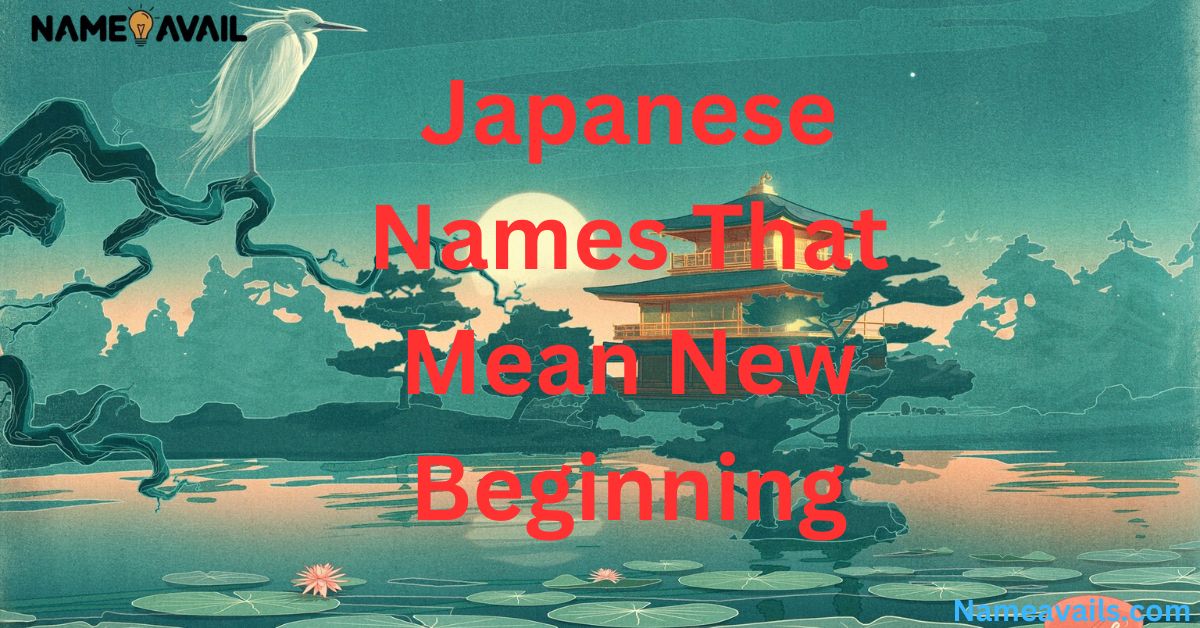Japanese names that mean “new beginning” are special names with meanings linked to fresh starts or new phases in life. These names often carry hopeful meanings, symbolizing a chance to start over or take a new path. Such names are meaningful in Japanese culture, representing positivity and growth.
Choosing a name with the meaning “new beginning” can be exciting. It feels like a new chapter is opening. Imagine the beauty of a name that inspires hope and renewal every time it’s spoken or written.
In Japanese, names that symbolize “new beginning” often use characters that represent rebirth, dawn, or a fresh start. Parents may choose these names for their children to give them strength, motivation, and a sense of possibility. These names are unique, rooted in tradition, and carry a beautiful message.
Significance Of New Beginning in Japanese Traditions
In Japanese traditions, new beginnings are seen as a chance to start fresh. They bring hope, renewal, and a positive outlook on life. This idea is celebrated in various cultural events and practices.
New Year’s Day, for example, is a major celebration symbolizing new beginnings. People clean their homes, make resolutions, and share meals to welcome a prosperous year. This focus on fresh starts reflects Japan’s deep respect for growth and renewal.
Factors to Consider When Choosing a Name
Choosing a Japanese name that means “new beginning” can be a beautiful way to bring hope, positivity, and inspiration into someone’s life.When selecting a name that represents a fresh start, it’s essential to think about the message you want the name to carry, as well as its cultural significance.
- Symbolic Meaning: Look into the specific meanings of each character in the name. Names with symbols for dawn, spring, or renewal might resonate with the idea of a new beginning.
- Sound and Pronunciation: Consider how the name sounds and how easy it is to pronounce, especially if it will be used internationally. This can help the name feel positive and welcoming.
- Cultural Significance: Some names are linked to important figures or concepts in Japanese culture. Understanding this background can add depth and respect to your choice.
Traditional Japanese Names Meaning New Beginning
Traditional Japanese names often reflect the beauty of new beginnings and fresh starts. Names like Hajime (meaning “beginning” or “first”) are popular for their simple yet profound meanings. Another example, Wataru, signifies crossing into a new path. Such names carry a cultural legacy of embracing change and hope, connecting individuals to Japanese heritage and values.
- Arata (新 / A-ra-ta): Arata means “fresh” or “new,” symbolizing a clean slate and fresh perspectives.
- Atsushi (篤 / A-tsu-shi): Atsushi signifies “sincerity” and “diligence,” embodying a strong commitment to a new path.
- Daiki (大輝 / Dai-ki): Daiki means “great radiance” or “big light,” symbolizing a bright start and a hopeful future.
- Hajime (始 / Ha-ji-me): Hajime translates to “beginning” or “start,” a clear representation of new beginnings.
- Haruto (陽翔 / Ha-ru-to): Haruto means “sunlight” or “soaring,” symbolizing a rising spirit and new potential.
- Hiroshi (浩 / Hi-ro-shi): Hiroshi means “abundant” or “prosperous,” suggesting a bountiful new start.
- Isamu (勇 / I-sa-mu): Isamu means “courage,” reflecting bravery in facing a new chapter.
- Jiro (次郎 / Ji-ro): Jiro means “second son,” symbolizing a new beginning in family or kinship.
- Kazuma (一真 / Ka-zu-ma): Kazuma means “one truth,” representing a firm new resolve and clarity.
- Kenji (賢司 / Ken-ji): Kenji means “wise” or “intelligent ruler,” symbolizing a wise and strategic start.
- Michihiro (道弘 / Mi-chi-hi-ro): Michihiro means “broad path,” symbolizing an expansive journey into new opportunities.
- Minato (湊 / Mi-na-to): Minato translates to “harbor” or “port,” a symbol of safe new arrivals and fresh journeys.
- Naoki (直樹 / Nao-ki): Naoki means “honest tree,” symbolizing integrity and growth in a new chapter.
- Noboru (昇 / No-bo-ru): Noboru means “to rise,” reflecting progress and a fresh ascent in life.
- Ren (蓮 / Ren): Ren means “lotus,” symbolizing purity, renewal, and rebirth from murky waters.
- Rikuto (陸斗 / Ri-ku-to): Rikuto means “land” or “earth,” symbolizing a grounded beginning and stability.
- Ryoma (龍馬 / Ryo-ma): Ryoma means “dragon horse,” symbolizing powerful new energy and resilience.
- Satoshi (聡 / Sa-to-shi): Satoshi means “wise” or “quick-thinking,” symbolizing intelligence guiding a fresh start.
- Shinji (真司 / Shin-ji): Shinji means “true second,” symbolizing trust and honesty in a renewed role or path.
- Takashi (隆 / Ta-ka-shi): Takashi means “prosperous,” representing a path toward flourishing new possibilities.
- Takumi (匠 / Ta-ku-mi): Takumi means “artisan” or “skillful,” symbolizing mastery and creativity in a fresh start.
- Tetsuya (哲也 / Te-tsu-ya): Tetsuya means “wise and philosophical,” reflecting a thoughtful new journey.
- Yamato (大和 / Ya-ma-to): Yamato means “great harmony,” symbolizing a unified and balanced new beginning.
- Yuto (悠斗 / Yu-to): Yuto means “gentle” or “distant,” symbolizing a peaceful, far-reaching new journey.
- Yūsuke (祐介 / Yu-su-ke): Yūsuke means “to help” or “assist,” symbolizing support and companionship in a new venture.
ALSO READ : Farewell Party Names
Unique Japanese Names Meaning New Beginning
For those seeking unique Japanese names that symbolize new beginnings, there are beautiful options like Arata, which means “fresh” or “new.” Names such as Sakura evoke the renewal of cherry blossoms in spring. Unique names often combine characters in novel ways, making each name meaningful and one-of-a-kind, perfect for marking the start of a new journey.Aiko (愛子 / Eye-ko): Aiko means “child of love,” symbolizing a fresh start filled with affection and warmth.
- Akemi (明美 / Ah-keh-mee): Akemi means “bright beauty,” representing a new beginning marked by radiance and allure.
- Haruna (春奈 / Hah-roo-nah): Haruna means “spring vegetables,” symbolizing a fresh start in harmony with nature’s rebirth in spring.
- Hayato (隼人 / Hah-yah-toh): Hayato means “falcon person,” symbolizing a bold new beginning, inspired by the strength and freedom of the falcon.
- Hikaru (光 / Hee-kah-roo): Hikaru means “light” or “radiance,” embodying a new start that shines brightly, filled with clarity.
- Hinata (日向 / Hee-nah-tah): Hinata means “sunny place,” symbolizing a fresh beginning filled with positivity and warmth.
- Hotaru (蛍 / Ho-tah-roo): Hotaru means “firefly,” representing a new start that glows with gentle, guiding light.
- Kana (加奈 / Kah-nah): Kana means “powerful beauty,” symbolizing a fresh start filled with strength and resilience.
- Kazumi (和美 / Kah-zoo-mee): Kazumi means “harmony and beauty,” symbolizing a new beginning marked by peace and aesthetic grace.
- Makoto (誠 / Mah-ko-toh): Makoto means “sincerity,” representing a new start that values honesty and truth.
- Mitsuki (美月 / Mee-tsu-kee): Mitsuki means “beautiful moon,” symbolizing a new beginning that brings light in the darkness.
- Natsuki (夏希 / Nah-tsu-kee): Natsuki means “summer hope,” symbolizing a fresh start brimming with warmth and optimism.
- Nozomi (望 / No-zo-mee): Nozomi means “hope,” representing a new beginning fueled by optimism and aspirations.
- Renji (蓮治 / Ren-jee): Renji means “lotus healer,” symbolizing a new beginning that brings healing and purity, inspired by the lotus flower.
- Ryuu (竜 / Ryoo): Ryuu means “dragon,” symbolizing a powerful new start with courage and strength.
- Saki (咲 / Sah-kee): Saki means “blossom,” representing a fresh start as vibrant and lively as blooming flowers.
- Satoru (悟 / Sah-toh-roo): Satoru means “enlightenment,” symbolizing a new beginning with wisdom and insight.
- Tsubasa (翼 / Tsoo-bah-sah): Tsubasa means “wings,” representing a fresh start marked by freedom and limitless potential.
- Yoshiko (良子 / Yoh-shee-ko): Yoshiko means “good child,” symbolizing a positive new beginning rooted in kindness and virtue.
- Yuzuki (柚月 / Yoo-zoo-kee): Yuzuki means “citrus moon,” representing a fresh start with calmness and renewal, inspired by the soothing moonlight.
Male Japanese Names That Mean New Beginning
Japanese names for boys that convey the idea of new beginnings are both strong and inspiring. Names like Haruki, meaning “shining brightly” and associated with spring, symbolize new life. Another name, Shinichi, combines “new” and “one,” making it ideal for a first-born or marking a fresh chapter. These names carry a sense of optimism and strength.
- Arata (新 / Ah-rah-tah): “Arata” means “fresh” or “new,” symbolizing a pure start and fresh opportunities.
- Hajime (始 / Hah-jee-meh): “Hajime” means “beginning” or “first,” representing the start of something significant or a pioneering spirit.
- Kenjiro (健二郎 / Ken-jee-roh): “Kenjiro” means “healthy second son,” symbolizing strength and a new path to good health.
- Risuke (利介 / Ree-soo-keh): “Risuke” means “beneficial helper,” indicating a supportive new beginning or beneficial start.
- Shinjiro (信二郎 / Shin-jee-roh): “Shinjiro” means “true second son,” symbolizing loyalty and a dependable new phase in life.
- Toshio (敏男 / Toh-shee-oh): “Toshio” means “talented man,” representing a new beginning filled with skill and wisdom.
- Toya (透也 / Toe-yah): “Toya” means “clear” or “transparent,” symbolizing a new beginning with clarity and honesty.
- Tomomasa (友正 / Toe-moh-mah-sah): “Tomomasa” means “true friend,” representing a new journey strengthened by friendship and loyalty.
- Yasushi (安志 / Yah-soo-shee): “Yasushi” means “peaceful will,” symbolizing a fresh start guided by calm and determination.
- Yoshito (義人 / Yoh-shee-toh): “Yoshito” means “righteous person,” symbolizing a new beginning marked by integrity and justice.
- Yoshinori (義則 / Yoh-shee-noh-ree): “Yoshinori” means “righteous rule,” representing a new era grounded in ethical leadership.
- Yorihisa (頼久 / Yoh-ree-hee-sah): “Yorihisa” means “enduring reliance,” symbolizing a new phase of steadfast support and trustworthiness.
- Yoshihisa (義久 / Yoh-shee-hee-sah): “Yoshihisa” means “righteous and long-lasting,” symbolizing a new, enduring commitment to integrity.
- Yoshiaki (義昭 / Yoh-shee-ah-kee): “Yoshiaki” means “righteous brightness,” representing a fresh start filled with moral clarity and hope.
- Yoshihiro (義弘 / Yoh-shee-hee-roh): “Yoshihiro” means “broad righteousness,” symbolizing a new beginning marked by extensive moral influence.
- Yoshinobu (義信 / Yoh-shee-noh-boo): “Yoshinobu” means “faithful righteousness,” representing a new phase of trust and virtue.
- Yoshitaka (義隆 / Yoh-shee-tah-kah): “Yoshitaka” means “righteous prosperity,” symbolizing a new start that brings wealth through integrity.
- Yoshiyasu (義康 / Yoh-shee-yah-soo): “Yoshiyasu” means “righteous peace,” symbolizing a harmonious beginning based on fairness.
- Yoshikazu (義和 / Yoh-shee-kah-zoo): “Yoshikazu” means “righteous harmony,” symbolizing a balanced new beginning with justice.
- Yoshitomo (義友 / Yoh-shee-toh-moh): “Yoshitomo” means “righteous friend,” symbolizing a fresh beginning grounded in loyalty and companionship.
- Yoshimasa (義政 / Yoh-shee-mah-sah): “Yoshimasa” means “righteous governance,” representing a new era of just leadership and moral authority.
- Yoshihide (義英 / Yoh-shee-hee-deh): “Yoshihide” means “righteous excellence,” symbolizing a new start with a commitment to ethical success.
- Yoshiro (義郎 / Yoh-shee-roh): “Yoshiro” means “righteous son,” symbolizing a fresh start characterized by moral qualities and familial honor.
- Yoshiya (義也 / Yoh-shee-yah): “Yoshiya” means “righteous also,” symbolizing a shared new beginning with integrity.
- Yoshio (義男 / Yoh-shee-oh): “Yoshio” means “righteous man,” representing a fresh start marked by integrity and masculinity.
- Yoshisuke (義介 / Yoh-shee-soo-keh): “Yoshisuke” means “righteous helper,” symbolizing a new phase of virtuous support for others.
- Yosuke (陽介 / Yoh-soo-keh): “Yosuke” means “sunny helper,” symbolizing a bright, supportive new beginning.
- Yoritaka (頼高 / Yoh-ree-tah-kah): “Yoritaka” means “reliable height,” symbolizing a strong foundation for a dependable new start.
- Yorimasa (頼正 / Yoh-ree-mah-sah): “Yorimasa” means “reliable justice,” symbolizing a new phase characterized by trustworthiness and integrity.
- Yorishige (頼重 / Yoh-ree-shee-geh): “Yorishige” means “enduring reliance,” symbolizing a steadfast, reliable new beginning.
Japanese Girl Names That Mean New Beginning
Many Japanese girl names reflect the beauty of renewal and starting anew. Hanae, meaning “flower blessing,” signifies growth and new life. Another choice, Miyu, can mean “beautiful reason” or “new beginnings” with the right kanji.
- Akari (明里 / あかり): Akari means “light” or “brightness,” symbolizing a new beginning filled with warmth and illumination.
- Asuga (明日香 / あすが): Asuga means “fragrance of tomorrow,” reflecting the freshness and potential of what’s to come.
- Choko (千子 / ちょこ): Choko means “butterfly child,” symbolizing transformation and new phases of life.
- Dai (大 / だい): Dai means “large” or “great,” signifying a new beginning with boundless possibilities and growth.
- Emica (恵美花 / えみか): Emica means “blessed beauty and flower,” representing a blossoming future filled with blessings.
- Fuyuko (冬子 / ふゆこ): Fuyuko means “winter child,” symbolizing the new beginnings that follow the end of a season.
- Hana (花 / はな): Hana means “flower,” symbolizing renewal and the bloom of a fresh start.
- Hatsu (初 / はつ): Hatsu means “first” or “new,” often symbolizing the start of something significant and promising.
- Hoshiko (星子 / ほしこ): Hoshiko means “star child,” symbolizing a guiding light for a fresh start.
- Hoshi (星 / ほし): Hoshi means “star,” representing hope and a shining new path forward.
- Izumi (泉 / いずみ): Izumi means “spring” or “fountain,” symbolizing a refreshing start and endless possibilities.
- Katsuki (香月 / かつき): Katsuki means “fragrant moon,” symbolizing the start of a new phase illuminated with beauty.
- Keiko (恵子 / けいこ): Keiko means “blessed child,” signifying a future filled with blessings and hope.
- Manami (愛海 / まなみ): Manami means “love and sea,” symbolizing a vast, nurturing new beginning.
- Mizuki (瑞希 / みずき): Mizuki means “auspicious hope,” representing a fresh start filled with promise.
- Nagi (凪 / なぎ): Nagi means “calm” or “lull,” symbolizing peace after a storm and a serene beginning.
- Nanami (七海 / ななみ): Nanami means “seven seas,” representing an expansive and adventurous new journey.
- Nao (直 / なお): Nao means “honest” or “straightforward,” symbolizing a true and sincere new beginning.
- Niko (二子 / にこ): Niko means “two children” or “second-born,” often symbolizing a fresh start as part of a pair or bond.
- Nori (紀 / のり): Nori means “law” or “order,” symbolizing a beginning with structure and a sense of purpose.
- Ren (蓮 / れん): Ren means “lotus,” symbolizing renewal and purity, like a lotus blooming anew from the water.
- Rika (理香 / りか): Rika means “logic and fragrance,” symbolizing a fresh start grounded in clarity and grace.
- Ruri (瑠璃 / るり): Ruri means “lapis lazuli,” symbolizing a new beginning with precious beauty and rarity.
- Sachiko (幸子 / さちこ): Sachiko means “happy child,” representing a new beginning filled with joy and blessings.
- Satsuki (皐月 / さつき): Satsuki means “fifth month,” symbolizing the beginning of summer and the blossoming of life.
- Seina (聖奈 / せいな): Seina means “holy apple,” representing a pure and wholesome new beginning.
- Suki (好き / すき): Suki means “beloved” or “liked,” symbolizing a new start filled with affection and care.
- Tsukiko (月子 / つきこ): Tsukiko means “moon child,” symbolizing a fresh phase guided by the light of the moon.
- Yoshiteru (吉照 / よしてる): Yoshiteru means “good shine,” symbolizing a bright, prosperous new beginning.
- Yua (結愛 / ゆあ): Yua means “binding love,” representing a new beginning filled with love and connections.
Japanese Names For New Life
Names that signify “new life” in Japanese carry deep meanings tied to growth and renewal. Saisei, directly meaning “rebirth” or “new life,” is one such name. Ikiru, meaning “to live,” also captures the essence of a new life. These names are powerful, representing resilience, growth, and the joy of a fresh beginning, embodying the beauty of starting anew.
- Akira (明 / Ah-kee-rah): Akira means “brightness,” symbolizing a fresh start with clarity and hope.
- Asuka (飛鳥 / Ah-ska): Asuka means “flying bird,” representing freedom and the potential for new beginnings.
- Aya (彩 / Eye-ah): Aya means “color,” symbolizing vibrancy and a renewed perspective on life.
- Ayumi (歩 / Ah-yoo-mee): Ayumi means “walking,” embodying the journey of life and moving forward with purpose.
- Haruki (春樹 / Ha-roo-kee): Haruki means “spring tree,” representing growth and renewal in the changing seasons.
- Haruto (陽翔 / Ha-roo-toh): Haruto means “sunlight flying,” symbolizing hope, light, and a fresh beginning.
- Hikari (光 / Hee-kah-ree): Hikari means “light,” representing guidance and a new direction in life.
- Hinata (日向 / Hee-nah-tah): Hinata means “sunny place,” symbolizing warmth, positivity, and new opportunities.
- Jiro (次郎 / Jee-roh): Jiro means “second son,” often symbolizing the renewal of family legacy and traditions.
- Jun (純 / Joon): Jun means “pure,” reflecting innocence and the fresh potential of a new life.
- Kaito (海斗 / Kai-toh): Kaito means “ocean soarer,” symbolizing exploration and the courage to start anew.
- Kanna (環 / Kan-nah): Kanna means “circle,” symbolizing unity and the continuous renewal of life.
- Kasumi (霞 / Kah-soo-mee): Kasumi means “mist,” representing a calm and gentle beginning, like the start of a new dawn.
- Kazuma (一馬 / Kah-zoo-mah): Kazuma means “harmony,” symbolizing balance and a peaceful start in life.
- Kiyomi (清美 / Kee-yoh-mee): Kiyomi means “pure beauty,” representing a fresh life filled with innocence and grace.
- Kokoro (心 / Koh-koh-roh): Kokoro means “heart,” symbolizing sincerity and the emotional foundation for a new journey.
- Mana (真名 / Mah-nah): Mana means “true name,” representing authenticity and a genuine beginning in life.
- Maki (真樹 / Mah-kee): Maki means “true tree,” symbolizing strong roots and steady growth.
- Ren (蓮 / Rehn): Ren means “lotus,” symbolizing purity and rebirth, like a fresh start emerging from muddy waters.
- Renji (連司 / Ren-jee): Renji means “connected wisdom,” representing a life guided by experience and unity.
- Ryota (涼太 / Ree-yoh-tah): Ryota means “cool and refreshing,” symbolizing a fresh, revitalizing new beginning.
- Sakura (桜 / Sah-koo-rah): Sakura means “cherry blossom,” a symbol of fleeting beauty and renewal each spring.
- Sora (空 / Soh-rah): Sora means “sky,” representing boundless opportunities and the open path ahead.
- Takeo (武夫 / Tah-keh-oh): Takeo means “warrior,” symbolizing strength and a determined start in life.
- Takeru (武 / Tah-keh-roo): Takeru means “brave,” representing courage and resilience in facing new challenges.
- Tatsuya (達也 / Tah-tsoo-yah): Tatsuya means “to reach,” symbolizing ambition and the journey toward new goals.
- Yoshito (義人 / Yoh-shee-toh): Yoshito means “righteous person,” symbolizing a life beginning with integrity and kindness.
- Yua (結愛 / Yoo-ah): Yua means “binding love,” representing a fresh start bound by love and connection.
- Yuto (悠斗 / Yoo-toh): Yuto means “gentle,” symbolizing a calm, peaceful beginning in life.
- Yua (結愛 / Yoo-ah): Yua means “binding love,” representing a fresh start bound by love and connection.
ALSO READ : Japanese Names That Mean Death
Incorporating Family Suggestions in Naming
In Japanese culture, incorporating family suggestions in naming reflects deep respect for family traditions and wisdom. When families are involved in choosing a name, it honors the shared values passed down through generations. This approach allows elders to share their insights, making the name selection a meaningful and inclusive process.
This practice also strengthens family bonds, creating a sense of unity and pride in the chosen name. Family members feel valued, knowing their opinions are respected, which deepens mutual trust and support. In this way, the name becomes a symbol of family connection and heritage.
FAQs
What is the Japanese name for the new beginning?
In Japanese, a popular term for a “new beginning” is “Shin Kaimon” (新開門), which combines “Shin” (新) meaning “new” with “Kaimon” (開門) meaning “opening” or “gate.” It conveys the sense of stepping through a new doorway or starting fresh.
What Japanese name means new spring?
The Japanese name for “new spring” is “Shinharu” (新春), where “Shin” (新) means “new,” and “Haru” (春) means “spring.” This name is associated with renewal, hope, and the fresh energy that comes with the spring season.
What is the Japanese name for rebirth?
“Saisei” (再生) is a common Japanese term for “rebirth.” It is composed of “Sai” (再) meaning “again” and “Sei” (生) meaning “life” or “birth.” “Saisei” represents the concept of being born anew, symbolizing renewal and transformation.
What is the Japanese name for beginning?
The Japanese word for “beginning” is “Hajimari” (始まり). This term captures the essence of a fresh start or origin, emphasizing the start of something new and significant in life or experience.
Conclusion
In Japanese culture, names hold deep meanings and reflect special concepts like renewal and fresh starts. Choosing Japanese names meaning new beginning can symbolize hope, growth, and new opportunities. These names, such as Shin Kaimon or Saisei, connect to ideas of positive change and fresh starts.
Names like Hajimari and Shinharu remind people of spring and rebirth, capturing the spirit of new beginnings. They bring encouragement and strength, perfect for anyone wanting to embrace a fresh start.

Helen Lisa is the admin of our platform dedicated to exploring the meanings and origins of names. With a deep interest in linguistics and culture, she curates insightful content to help users uncover the stories behind names. Helen’s expertise ensures a valuable and engaging experience for our audience.











